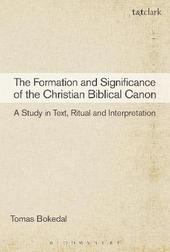
|
The Formation and Significance of the Christian Biblical Canon: A Study in Text, Ritual and Interpretation
Hardback
Main Details
| Title |
The Formation and Significance of the Christian Biblical Canon: A Study in Text, Ritual and Interpretation
|
| Authors and Contributors |
By (author) Tomas Bokedal
|
| Physical Properties |
| Format:Hardback | | Pages:440 | | Dimensions(mm): Height 234,Width 156 |
|
| Category/Genre | Biblical studies |
|---|
| ISBN/Barcode |
9780567378903
|
| Classifications | Dewey:220.6 |
|---|
| Audience | |
|---|
|
Publishing Details |
| Publisher |
Bloomsbury Publishing PLC
|
| Imprint |
T.& T.Clark Ltd
|
| Publication Date |
7 November 2013 |
| Publication Country |
United Kingdom
|
Description
This book offers a fresh cross-disciplinary approach to the current discussion on the Christian canon formation process. By carefully integrating historical, hermeneutical and theological aspects to account for the emergence of the canon, it seeks to offer a more comprehensive picture of the canon development than has previously been achieved. The formation and continuous usage of the Christian biblical canon is here viewed as an act of literary preservation and actualization of the church's apostolic normative tradition - 'the Scriptures and the Lord' - addressing, first of all, the church, but also the wider society. In order to grasp the complex phenomenon of the biblical canon, the study is divided into four parts, focusing respectively on linguistic and effective-historical, textual and material, performative, and ideational aspects of the canon. Attention is given to the scribal nomina sacra convention, the codex format, oral and written Gospel, early Christian liturgical praxis and the Rule of Faith. Bokedal argues that the canon was formed in a process, with its own particular intention, history, and direction. Throughout the study, history and theology, past and present are considered alongside each other. By using a Gadamerian hermeneutics of tradition, the reader's attention is directed to historical dimensions of the canon and its interpretative possibilities for our time. The notion of effective history (Wirkungsgeschichte), as well as the interaction between text, community and reader are crucial to the argument. The canonical text as text, its interpretation and ritual contextualization are highlighted as unifying elements for the communities being addressed.
Author Biography
Tomas Bokedal (Th.D., Lund) is lecturer in New Testament at King's College, University of Aberdeen, UK. His researchinterests include Christian origins and the relation of Scripture and theology. He has authored several articles and books on the biblical canon.
ReviewsOne particularly helpful feature of the book is that it does not assume an advanced knowledge of the current debates about the codex and nomina sacra, and it adequately brings the reader up to speed on these topics. This book would be best suited for undergraduates and non-specialists, while those who specialize in canon formation could benefit from the author's original interpretation of what 'canon' is. * Theological Book Review * Bokedal has provided an excellent contribution to the study of the biblical canon. He conversant with both primary and secondary sources, provides several interesting and intriguing insights, and is willing to engage many areas that most studies of the canon neglect ... A much-needed and worthwhile volume on canon formation from which scholars will benefit for years to come. * Books at a Glance * I read this book chapter by chapter with growing excitement, and was especially impressed by the broad historical knowledge concerning canonical and textual context as well as the theological and hermeneutical aspects of the topic. This book makes an important contribution to the theology of canons and biblical hermeneutics, and is one of the most interesting in the past 15 years. -- Heinrich Assel, University of Greifswald, Germany The origins of the New Testament canon are much debated at present but too often with prior commitments to a religious position. Tomas Bokedal here examines the empirical evidence in an open-minded way and succeeds in presenting genuinely fresh and original conclusions. His treatment, for example, of the nomina sacra, words written in contracted form in New Testament manuscripts, goes beyond anything currently available elsewhere. This is a study of the origins of the New Testament that needs to be taken seriously not only by biblical scholars but by those interested in the early Church and, indeed, in theology generally. Essential reading. -- John Barton, University of Oxford, UK Tomas Bokedal provides a wonderfully rich and informative study of the formation and nature of the canon, focusing not only on its historical, hermeneutical, and philosophical foundations, but also--and most importantly--on its theological/christological basis. He brings a much needed clarity to the canonization process and at the same time demonstrates the integrity of the canon in the face of current challenges. This book will remain an important resource for years to come. -- Donald A. Hagner, Fuller Theological Seminary, USA Tomas Bokedal has clearly demonstrated that the issue of the canon is far more than simply determining which books belong in the Christian Bible and why. He undertakes a detailed study of the procedural, material, structural, and conceptual dimensions of the continuing process of canon formation in the Church. Each of these areas contains fascinating material for further thought. Bokedal truly shows that the process of canon formation is also an exercise in Wirkungsgeschichte. -- Stanley E. Porter, McMaster Divinity College, Canada
|